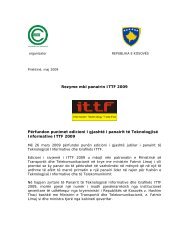KOSOVO
The Legal Guide to Kosovo - ECIKS
The Legal Guide to Kosovo - ECIKS
- No tags were found...
Create successful ePaper yourself
Turn your PDF publications into a flip-book with our unique Google optimized e-Paper software.
The Republic of Kosovo was declaredindependent on 17 February, 2008. InApril 2008 the Assembly of the Republicof Kosovo adopted the new constitutionwhich has entered into force on 15 June2008.Kosovo’s constitution is based on the ComprehensiveProposal for a Status Settlementfor Kosovo, submitted by United NationsSpecial Envoy for the resolution of Kosovo‘sstatus (the „Ahtisaari Plan“), which providesfor supervised independence, overseen bytwo international institutions, namely EuropeanUnion Rule of Law Mission in Kosovo(EULEX) and the International CivilianOffice (ICO). The Ahtisaari Plan provides anumber of overriding protections for Kosovo‘sminorities and authorizes EULEX toassist Kosovo authorities in the rule of lawarea, with a particular focus on police, judiciaryand customs. In this respect, EULEXretains limited executive powers, in particularto investigate, prosecute and adjudicate seriousand sensitive crimes in cooperation withthe Kosovo justice institutions. ICO, on theother hand, is responsible for supervising theimplementation of the Ahtisaari Plan.1.1 History of the LegalSystemUnder the 1974 constitution of the SocialistFederal Republic of Yugoslavia (SFRY),Kosovo was an “autonomous province” withinthe SFRY and, as such, enjoyed substantialsovereign rights.As an autonomous province in the SFRY, Kosovohad a parliament, government, judiciary,constitutional court and a national bank. InMarch 1989, following the rise to power ofSlobodan Milosevic, Kosovo’s autonomy wasunlawfully abolished and Serbia assumed fullcontrol over the province. Shortly thereafter,the newly installed regime dismissed all KosovoAlbanians from their public positions,including the judiciary. Following the disintegrationof SFRY, the aforementioned constitutionalchanges were sanctioned into law bythe 1992 constitution of the Federal Republicof Yugoslavia, which was constituted of onlySerbia and Montenegro. While some of dismissedKosovo Albanian judges and prosecutorsmoved to the private practice, the lawlessnessand widespread corruption that ensuedthe installation of the Milosevic regime inthe province rendered their roles as attorneysobsolete. Consequently, most of them wereforced out of the legal profession completely.Following the end of the war in June 1999 theprovince was placed under an internationalprotectorate, pursuant to United Nations SecurityCouncil Resolution 1244, and was administeredby United Nations Mission in Kosovo(UNMIK), while NATO based KosovoForce (KFOR) provided for overall security.In accordance with UNSC Resolution 1244,UNMIK assumed full competencies in thelegislative, executive and judicial branches ofgovernment that were exercised by the SpecialRepresentative of the Secretary General(SRSG). In order to fill the legislative gapcreated during the decade of Milosevic‘s rule,UNMIK enacted laws in the form of executivedecrees, commonly referred to as “UNMIKRegulations”. UNMIK regulations were intendedto complement, and govern the precedenceof, different legal instruments enactedin the past. Indeed, while the bulk of Kosovolegislation remained relevant, a number oflaws enacted during Milosevic‘s rule, whichintroduced discriminatory provisions againstthe Kosovo Albanian community, were repealed.Consequently, UNMIK authorizedthe application of the provincial law as it wasin effect as of 22 March 1989 (before the abolishmentof Kosovo‘s autonomy) except in caseswhere these legal instruments were enactedprior to 22 March 1999 and were discriminatory.During its mandate, UNMIK progressivelydeveloped a comprehensive modernlegal framework, which culminated with theenactment of the Constitutional Frameworkof Kosovo, on the basis of which, the people ofKosovo were able to democratically elect theirrepresentatives in the local and central level.In 2000, UNMIK established an emergencyjustice system exclusively composed of localjudges and prosecutors, who were subsequentlyjoined by a limited number of internationaljudges and prosecutors, who were responsiblefor serious and sensitive crimes. While, in theexecutive and legislative branches of government,UNMIK gradually transferred its competenciesto Kosovo authorities, UNMIKretained executive control over the judiciaryuntil Kosovo‘s independence.Although following the entry into effect ofKosovo constitution in 2008, UNMIK’s rolebecame largely redundant; UNMIK is stillpresent in Kosovo and continues to facilitateKosovo‘s relations with countries that havenot formally recognized its independence ingeneral and Serbia in specific.7








